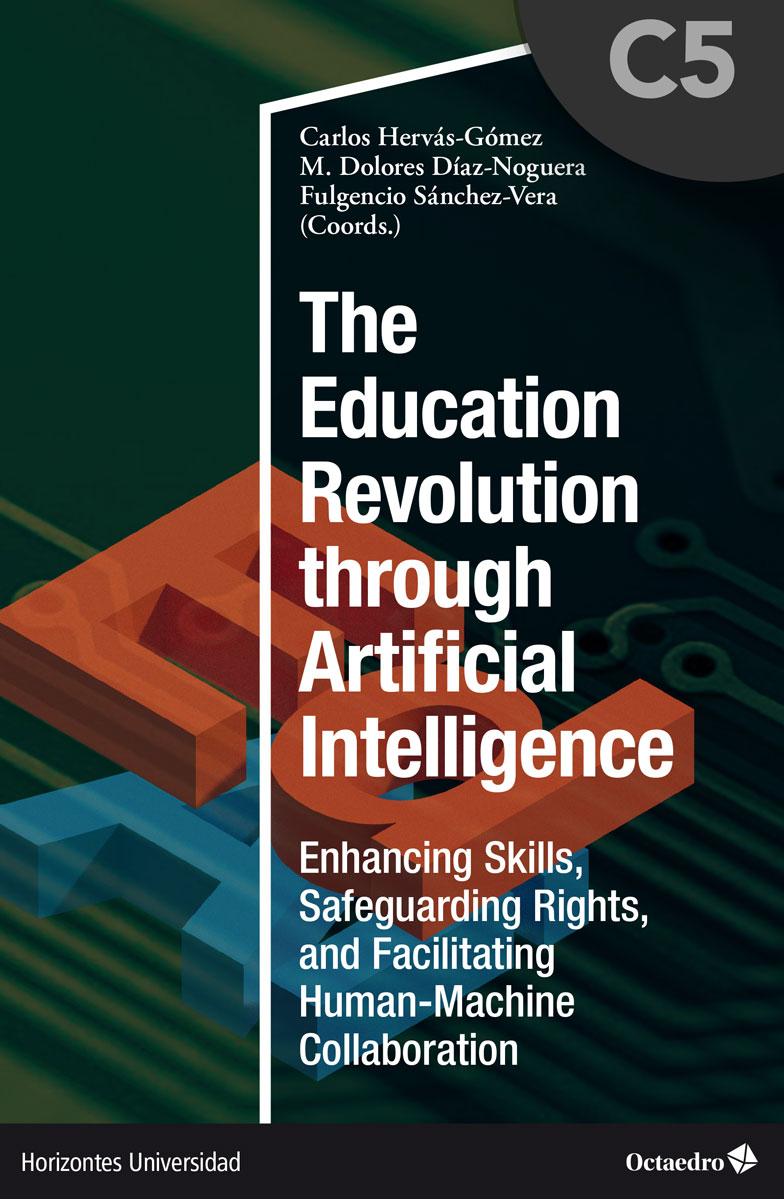FICHA TÉCNICA
Fecha de publicación:
04/11/2024
Doi del capítulo:
Título del libro: The Education Revolution through Artificial Intelligence
URL del libro:
ISBN del libro: 9788410282582
DOI del libro:
Abstract
Competency-based training focuses both on the development of capabilities, skills and knowledge, as well as on education in values, experiences and attitudes that, when integrated, are aimed at the successful performance of the student. In this sense, active methodologies, particularly project-based learning (PBL), provide an opportunity for students to apply and develop skills in real situations and through teamwork, making use of the potential of the application of information and communication technologies (ICT), such as Artificial Intelligence. In this context, the present study aimed to assess the methodology applied in the experience of project-based learning and Artificial Intelligence in the online training of mechanical engineers. The experience was developed in the degree of Mechanical Engineering at two universities (National University of San Agustín de Arequipa, Perú and the Technological University of Havana, Cuba) in two subjects, respectively: Mathematical logical reasoning and Pedagogy and didactics of higher education. The analysis was carried out based on a set of achievement indicators (pass, fail, dropout and withdrawal), and it allowed for a comparative study between 2022 and 2023 that offers valuable results in the online training process of these students. The methodology used, the analysis carried out and the impact obtained constitute a motivating guide for today’s higher education.
Palabras clave
Autores
PhD Arasay Padrón Alvarez
Universidad Internacional de Valencia, Spain
arasay.padron@professor.universidadviu.com
http://orcid.org/0000-0002-2248-7776
PhD Vladimir A. Rosas Meneses
Universidad Nacional de San Agustín de Arequipa, Perú
vrosas@unsa.edu.pe
http://orcid.org/0000-0001-9508-8743
Cómo citar
Arasay Padrón Alvarez, A., Vladimir A. Rosas Meneses, V. A. (2024). From Theory to Practice with Artificial Intelligence: Experience of Project-based Learning in Higher Education. In Hervás-Gómez, C., Díaz-Noguera, M. D., Sánchez-Vera, F. (Coords.), The Education Revolution Through Artificial Intelligence (pp. 71-86). Octaedro. https://doi.org/10.36006/09651-1-05
Referencias bibliográficas
«Aguilar, G. M. F., Gavilanes, D. C. A., Freire, E. M. A., & Quincha, M. L. (2023). Artificial Intelligence and university education: A systematic review. Magazine of Sciences: Magazine of Research and Innovation, 8(1), 109-131. https://doi.org/10.33262/rmc.v8i1.2935
Albarrán, F. A., & Díaz, C.H. (2021). Problem-based learning methodologies, projects and case studies in the critical thinking of university students. Journal of Medical Sciences of Pinar del Río, 25(3), e5116. http://scielo.sld.cu/scielo.php?pid=S1561-31942021000300013&script=sci_arttext
Álvarez-Álvarez, C., & Falcon, S. (2023). Students’ preferences with university teaching practices: analysis of testimonials with Artificial Intelligence. Education Tech Research Dev., 7(1), 1709–1724. https://doi.org/10.1007/s11423-023-10239-8
Baek, C., & Doleck, T. (2023). Educational data mining versus learning analytics: A review of publications from 2015 to 2019. Interactive Learning Environments, 31(6), 3828-3850. https://www.tandfonline.com/doi/abs/10.1080/10494820.2021.1943689
Batistello, P., & Pereira, A. T. C. (2019). Learning based on competencies and active methodologies: applying gamification. Scientific Journal of Architecture and Urbanism, 40(2), 31-42. https://rau.cujae.edu.cu/index.php/revistaau/article/view/536
Bellomo, S. T. (2023). Artificial Intelligence in higher education: An analytical evaluation. Journal of Ethics in Higher Education, 3, 87-114. https://jehe.globethics.net/article/view/4626
Bernardo, C. E., Rivera, C. N., Eche, P., & Lizama, V. E. (2023). Metacognitive strategies and autonomous learning in education students at the Universidad Nacional Federico Villarreal. Horizons. Journal of Research in Educational Sciences, 7(28), 1002-1012. https://doi.org/10.33996/revistahorizontes.v7i28.570
D’Mello, S., Dieterle, E., & Duckworth, A. (2017). Advanced, analytical, automated (AAA) measurement of engagement during learning. Educational Psychologist, 52(2), 104-123. https://pubmed.ncbi.nlm.nih.gov/29038607/
García, V. A., Villaverde, V. A., Benito, V. D., & Muñoz, R. C. (2020). Project-based learning and formative assessment strategies: Perception of university students. Ibero-American Journal of Educational Evaluation, 13(1), 93-110. https://dialnet.unirioja.es/servlet/articulo?codigo=7408493
González, C. S. (2023). El impacto de la inteligencia artificial en la educación. Transformación de la forma de enseñar y de aprender. Qurriculum, 36, 59-60. https://www.researchgate.net/deref/https%3A%2F%2Fdoi.org%2F10.25145%2Fj.qurricul.2023.36.03?_tp=eyJjb250ZXh0Ijp7ImZpcnN0UGFnZSI6InB1YmxpY2F0aW9uIiwicGFnZSI6InB1YmxpY2F0aW9uIn19
Juárez-Pulido, M., Rasskin-Gutman, I., & Mendo-Lázaro, S. (2019). Cooperative Learning, an active methodology for 21st century education: a bibliographic review. Prisma Social Magazine, 26, 200-210. https://revistaprismasocial.es/article/view/2693
Llorens-Largo, F., Villagrá-Arnedo, C., Gallego-Durán, F., & Molina-Carmona, R. (2021). COVID-proof: how project-based learning has withstood confinement. Virtual Campuses, 10(1), 73-88. http://uajournals.com/ojs/index.php/campusvirtuales/article/view/746
López, A., Gómez, C. E., & Ramos, G. (2022). Didactic procedures for the development of learning. Conrado, 18(86), 186-197. http://scielo.sld.cu/scielo.php?script=sci_arttext&pid=S1990-86442022000300186&lng=es&tlng=en
Loyens, S., Magda, J., & Rikers, R. (2008). Self-directed learning in problem based learning and its relationships with self-regulated learning. Educational Psychology Review, 20(4): 411-427. https://doi.org/10.1007/s10648-008-9082-7
Mitxelena-Hoyos, O., Amaro-Mellado, J.L., Martínez-Álvarez, F. (2021). Use of IT in Project-Based Learning Applied to the Subject Surveying in Civil Engineering. https://doi.org/10.1007/978-3-030-57799-5_44
Ocaña-Fernández, Y., Valenzuela-Fernández, L. A., & Garro-Aburto, L. L. (2019). Artificial Intelligence and its implications in higher education. Purposes and Representations, 7(2), 536-568. http://dx.doi.org/10.20511/pyr2019.v7n2.274
Padrón, A., Bedregal-Alpaca, N., Rodríguez, J., & Torres, C. (2022). Design of Didactic Sequences to Strengthen Creativity and Commitment in Online Training. Dykinson, Casalini. http://digital.casalini.it/9788411225748 – Casalini id: 5336300
Rapanta, C., Botturi, L., Goodyear, P. et al. (2021). Balancing technology, pedagogy and the new normal: Post-pandemic challenges for higher education. Postdigit Sci. Educ., 3, 715-742. https://doi.org/10.1007/s42438-021-00249-
Rodríguez, M., & Hernández, Z. (s. f.). Project Based Learning (PBL) from the Natural Sciences.
Rodríguez, M. A., Ramos, A. B., González, A. B., Vivar, A. M., Revilla, I., Ausín, T., & Martín, J. F. (2011). Continuous Evaluation Systems in Engineering Degree Studies. https://gredos.usal.es/handle/10366/112725
Rua, E., Henríquez, R., & Jordán, I. J. C. (2023). Analysis of project-based learning and collaborative strategies in engineering careers during the COVID-19 pandemic. Case: control theory course I. Scientific Initiation Magazine, 9(1), 55-63. https://doi.org/10.33412/rev-ric.v9.1.3519
Salido, P. V. (2020). Active Methodologies in Initial Teacher Training: Project Based Learning (PBL) and artistic education. https://digibug.ugr.es/handle/10481/63803
Urday, J. R., & Deroncele, A. (2022). Meaningful teaching-learning in a virtual educational environment. Conrado, 18(86), 322-331. http://scielo.sld.cu/scielo.php?script=sci_arttext&pid=S1990-86442022000300322&lng=es&tlng=pt
Villalobos, M. I. (2022). Project-based Learning Methodology and its Influence on the Development of Soft Skills in Upper Basic Students of the Dr Kind Rosero León (bachelor’s thesis). National University of Chimborazo. http://dspace.unach.edu.ec/handle/51000/9704
Ye-Lin, Y., Prats-Boluda, G., García-Casado, J., Estelles, E. G., & Martínez-de-Juan, J. L. (2019). Design, application and assessment of activities aimed at working and evaluating multiple transversal skills in large groups of master ‘s degrees in engineering, using project-based learning. Educatio Siglo XXI, 37(Nov-Feb), 133-162. https://doi.org/10.6018/educatio.399»
